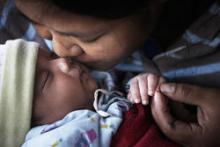
The Essential Package provides critical supports for highly vulnerable children. However, there are children, such as those living with HIV and AIDS, a disability, or other risk factors to development, who need additional protective interventions to enable their growth and development in a healthy manner. Children afflicted by HIV and AIDS, whether infected or affected, typically suffer severe developmental delays. In addition, mothers who do not receive adequate antenatal and postnatal care, including PMTCT, may suffer complications during their pregnancies which may result in disabilities. Frequent and recurring illnesses in early childhood that do not receive proper medical attention may also result in disability or even death. Early intervention, treatment, and consistent support have been shown to be effective responses to the unique challenges of these children.
This course will explore the role of “shocks” in the development of young children which can lead to developmental delays. Through discussion of red flags in the course of development, the learner will be able to identify potential warning signs which may indicate the need for intervention. Finally, the course will explore the needs of children with HIV and/or disabilities and potential interventions for such children so that they can reach their developmental potential.
This course is the fourth course of six courses in the Early Childhood Development (ECD) series which aims to engage staff of implementing agencies involved in existing ECD programs, focusing on vulnerable children affected by HIV, or facing other challenges such as chronic poverty, displacement, or conflict.
The ECD series is based on the Essential Package: Holistically Addressing the Needs of Young Vulnerable Children and Their Caregivers Affected by HIV and AIDS, which was developed by the Inter-Agency Taskforce on HIV and ECD led by Save the Children and CARE in collaboration with the Consultative Group on Early Childhood Care and Development, the Centers for Disease Control, and ChildFund with funding from the Conrad N Hilton Foundation.
Objective
By the end of the course, the learner will be able to:
- Understand the role of shocks in the course of a child’s development
- Define the terms “red flag” and “developmental delay” as it relates to child development
- Understand the role of assessment and observation in identifying and responding to potential red flags
- Describe special considerations for children with HIV/AIDS and/or disabilities and interventions to support such children
- Understand the role of policy in ensuring inclusion of these children in quality early learning experiences
Credits
The course content was collaboratively developed by Save the Children, Kaijage Consultants for African Family Health, and Nepiala Sikero from Montfort College, Malawi.
The course authors would like to acknowledge the following technical reviewers for their valuable input:
- Adele Clark, Catholic Relief Services
- Sarah Dastur, PACT
- Colleen Farrell, Save the Children
- Nicole Richardson, Save the Children
- Janet Shriberg, USAID
- Camille Smith, Centers for Disease Control and Prevention
- Pablo Stansbery, Save the Children
Time
- 2 hours
Published/Updated
- Friday, September 6, 2013
Course Authors:
Kendra Blackett-Dibinga, Save the Children
Course Managers:
- Lisa Mwaikambo, CCP
Related Courses
- Introduction to Early Childhood Development
- Integrated Early Childhood Development Programming for Young Vulnerable Children
- Improving the Lives of Young Vulnerable Children and Their Caregivers
- Creating an Enabling Environment for Young Vulnerable Children and Their Caregivers
- M&E of Holistic ECD Programs
